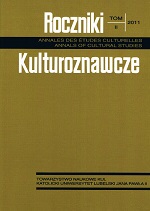Istota teatru
The Essence of the Theatre
Author(s): Wojciech KaczmarekSubject(s): Cultural Essay, Political Essay, Societal Essay
Published by: Towarzystwo Naukowe KUL & Katolicki Uniwersytet Lubelski Jana Pawła II
Keywords: theatre; drama; theatre anthropology; relationship; theo-drama; persona; personalism; person; actor; role; scene
Summary/Abstract: The author of the article, assuming that the theatre, already in Ancient Greece, was connected with co-participation of persons constituting the community of polis, calls for equal recognition of the idea of man, who creates the theatre and who visits it, in the contemporary outlook upon the theatre. The relational dimension of the theatre has existed since antiquity when it was strictly connected with a political and religious function uniting the community and reached the point of contemporary perception of the theatre as an independent art. The most crucial outcome resulting from the combination (theatre and anthropology) shows the art of theatre as a place of forming the conception of the world as a performance (suggestions of H.U. von Balthasar and of H. Gouhier, of J. Tischner, of A. Krąpiec). On the stage, theatre audience can find a metaphorical image of his or her life, of general fate of a man portrayed as a tragic being, suspended between life and death. Independently of the kind of performance given on the stage (comedy, tragedy, farce), a relation between the actor and theatre audience is a clue issue of the theatre. The author also shows the genesis of theatre formation, outlines the notion of the actor, stage acting, theatre roles, scenes and of theatre audience participation. Because the theatre as an art form does not have a stiff pattern, it acquires its shape at a concrete point of time during the stage performance (in statu nascendi). Therefore it requires the presence of theatre audience throughout the whole time of its duration. Because of that aspect, it is fundamentally personalistic at its roots. If a stage performance is not viewed on the grounds of personalistic categories, it stops being called the theatre and turns into a show devoid of personalistic relationships.
Journal: Roczniki Kulturoznawcze
- Issue Year: 2011
- Issue No: 2
- Page Range: 89-107
- Page Count: 19
- Language: Polish

